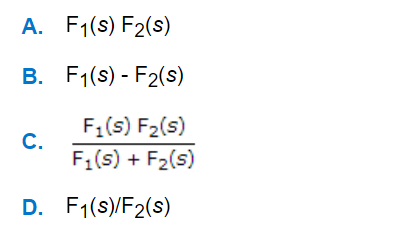Question

a.
A
b.
B
c.
C
d.
D
Posted under Electronics and Communication Engineering
Interact with the Community - Share Your Thoughts
Uncertain About the Answer? Seek Clarification Here.
Understand the Explanation? Include it Here.
Q. If F1(s) and F2(s) are two positive real functions, then the function which is always positive real is
Similar Questions
Explore Relevant Multiple Choice Questions (MCQs)
Q. Two coupled coils A and B are connected in series. The total inductances in series aiding and series opposing connections are LA and LB. The mutual inductance M is
View solution
Q. The differential equation for the current i(t) in the circuit of the figure is
View solution
Q. In the circuit shown in figure, maximum power will be transferred when
View solution
Q. For the mechanical system of figure, the correct differential equation is (where x = displacement in m, M = mass in kg, B = damping constant, N - sec/m K is spring constant, N/m and F = force, newton).
View solution
Q. In the given circuit, V1 = 40 V when R is 10 Ω. When R is zero, the value of V2 will be
View solution
Q. An input circuit has both direct and alternating current flowing through it. It is desired to transfer alternating current only by using one of the coupling units shown in figure. The coupling circuit which will do this job most effectively is
View solution
Q. Consider the following statements:
View solution
Q. A series RLC circuit is overdamped when
View solution
Q. In figure, V1 = 40 V when R = 10 Ω, if R = 0, V2 will be
View solution
Q. The time constant of the circuit in figure is
View solution
Q. In terms of ABCD parameters, the image parameter Z11 is equal to
View solution
Q. In figure the number of tree branches and links respectively are
View solution
Q. For the wave shown in figure, the average value is
View solution
Q. Consider the following two statements:
View solution
Q. Paley Wiener criterion states that a necessary and sufficient condition for an amplitude function |H(jω)| to be causal is that
View solution
Q. Choose the correct option, where H(s) is transfer function, Z(s) is driving point impedance functions
View solution
Q. In figure, V reads 45V. Then I =
View solution
Q. For the time domain response shown in figure the pole
View solution
Q. A system described by the following differential equation is initially rest for input x(t) = 2 u(t), the output y(t) is
View solution
Q. Consider the following two statements:
View solution
Recommended Subjects
Are you eager to expand your knowledge beyond Electronics and Communication Engineering? We've handpicked a range of related categories that you might find intriguing.
Click on the categories below to discover a wealth of MCQs and enrich your understanding of various subjects. Happy exploring!








